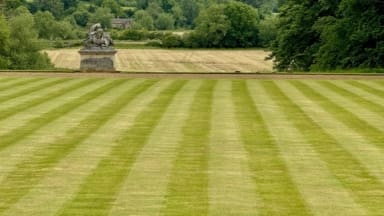
Writing in the Lawn Association’s newsletter, Chairman and lawn expert, David Hedges Gower writes that despite the omnipresence of lawns in most gardens across the country, if you attend garden shows and retail events, you may be under the impression that lawns barely exist.
According to Hedges-Gower, gardening institutions aren’t supportive of sustainable lawn care despite being an integral part of gardens. “Lawns, like all aspects of gardening, are evolving. We’re rethinking herbicide usage, watering practices, and all aspects of lawn maintenance. ‘No Mow May’ has become popular, but also raises contradictions. Should there be a ‘No Weed Your Garden in May’ too?”, writes Hedges-Gower.
He adds: “Should we then start spreading weed seeds in borders to boost pollination elsewhere? The garden shows often feel like a scripted act, while I’m just the heckler trying to get a word in edgewise.”
There is no doubt, lawns get a bad rap and yet, there is certainly a place for a sustainable lawn in gardening. When conscious choices are made to minimise water consumption, eliminate/reduce chemical usage (or switching to natural alternatives), selecting native grasses, supporting natural processes and adjusting mowing practices, lawns can be environmentally friendly.
Moreover, lawns offer a visual breathing space and practical living area. Lawns can also provide a sanctuary for a host of invertebrates, from larvae and earthworms in the soil to beetles and insects in the grass. All of this life in turn provides a meal for birds such as blackbirds, robins and thrushes, as well as hedgehogs, frogs and many other animals.
According to Hedges-Gower, due to “the institutional neglect” of lawns and misconceptions as to their sustainability, lawns are in decline, which may be a factor in the worrying rise of artificial grass usage. In 2020, the global market for artificial grass stood at approximately £2.4 billion with projections suggesting it could surpass £4 billion by 2027 (Greenmatch). “It may sound extreme, but once upon a time, artificial grass was promoted as the latest trend at some of these garden shows. Now, with its environmental downsides becoming clear, the same institutions are scrambling to campaign against it—though true campaigns usually require more than just a change in PR narrative,” writes Hedges-Gower.
“I’m all for making gardening more eco-friendly, but there’s plenty of hypocrisy in this debate. When lawns are unfairly targeted, I’ll always speak up—especially when the criticisms don’t hold water,” he adds.
The Lawn Association is an educational platform dedicated to promoting sustainable lawn care practices and dispelling common misconceptions within the industry. Through advocacy and education, the association seeks to foster environmental stewardship among lawn enthusiasts across the United Kingdom

